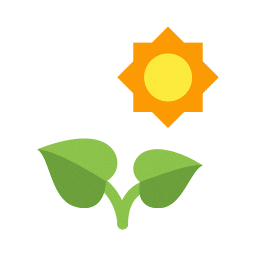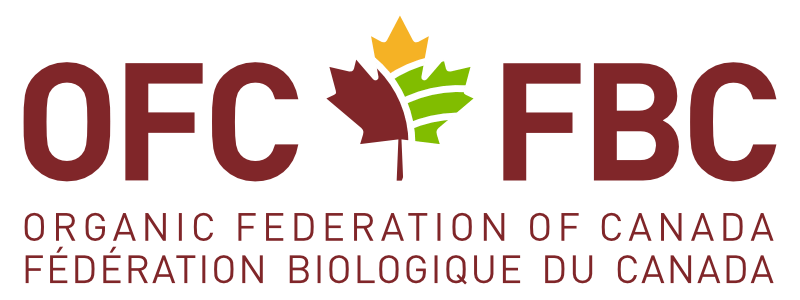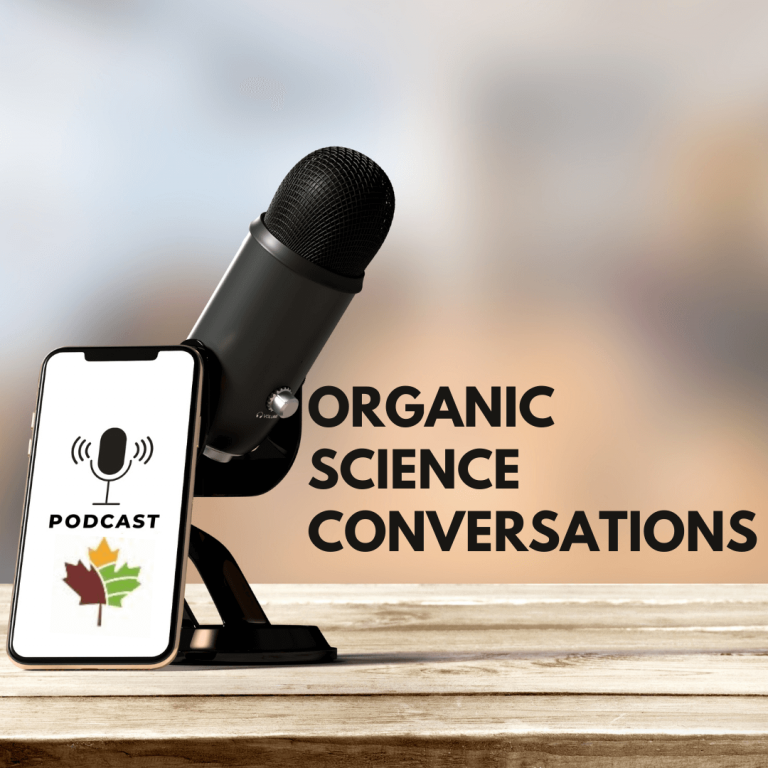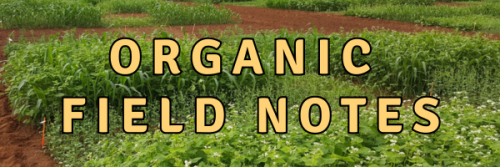
Welcome to the first issue of Organic Field Notes,
your quarterly update from Organic Science Cluster 4.
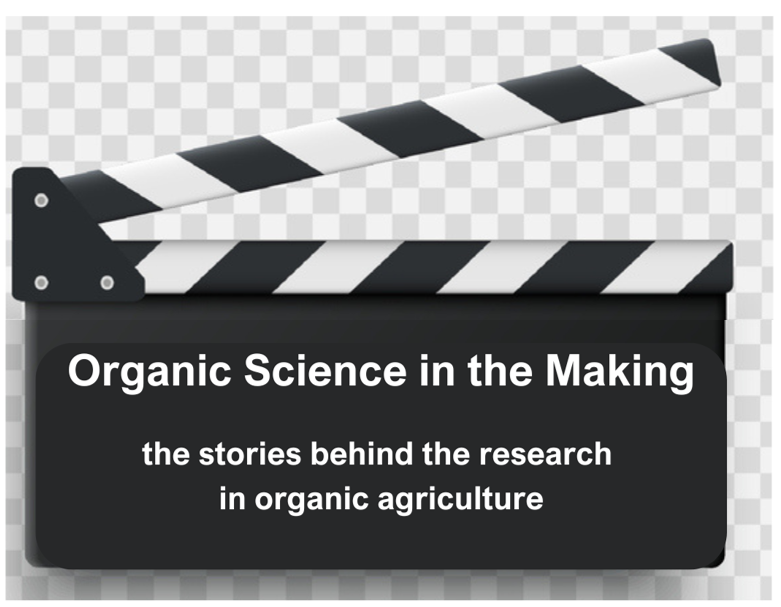
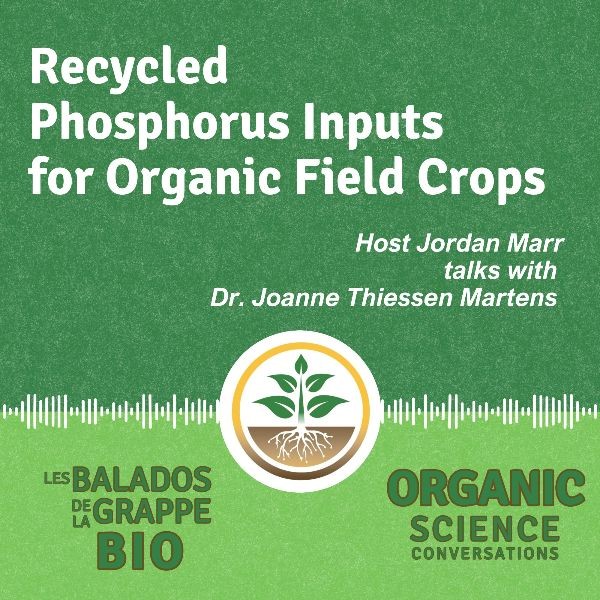
Watch An Integrative Approach to Managing Organic Vineyards, the first film in OSC4’s documentary series, Organic Science in the Making!
Join Dr. Vasseur as she shares her “landscape approach” for boosting vineyard productivity and resilience in the face of climatic and environmental changes.
Listen to Recycled Phosphorus Inputs for Organic Field Crops on Organic Science Conversations.
In this podcast, Jordan Marr talks with Dr. Joanne Thiessen Martens about the phosphorus problem on organic farms and how her research on recycled inputs could benefit both crop agronomy and the environment.
And all the articles published on the webpage
News – The latest news from OSC4
Go to Archive to see past issues.
The Organic Science Cluster 4 – 14 research activities in organic agriculture across Canada, from 2023 to 2028
Organic research continues
The Organic Science Cluster 4 is officially launched!
On October4, 2024, Kody Blois, Member of Parliament for Kings–Hants, Nova Scotia and Chair of the Standing Committee on Agriculture and Agri-Food has announced up to $6.8 million for Organic Science Cluster 4 (OSC4) through Agriculture and Agri-Food Canada’s (AAFC) AgriScience Program, an initiative under the Sustainable Canadian Agricultural Partnership. AgriScience Clusters support projects intended to mobilize industry, government and academia through partnerships and address priority national themes.
The Organic Federation of Canada (OFC) will leverage AAFC’s contribution with an additional $5.3 million from more than 80 funding partners for a total investment of $12.1 million over five years. Led by the OFC, in cooperation with the Organic Agriculture Centre of Canada (OACC), the OSC4 addresses organic sector priorities and contributes to Government priorities in areas of climate change mitigation, agriculture sector resilience, and economic development.
The Organic Science Cluster 4 includes 14 research activities
led by Canadian scientists committed to improving
the sustainability of organic production systems.
To learn more about OSC4
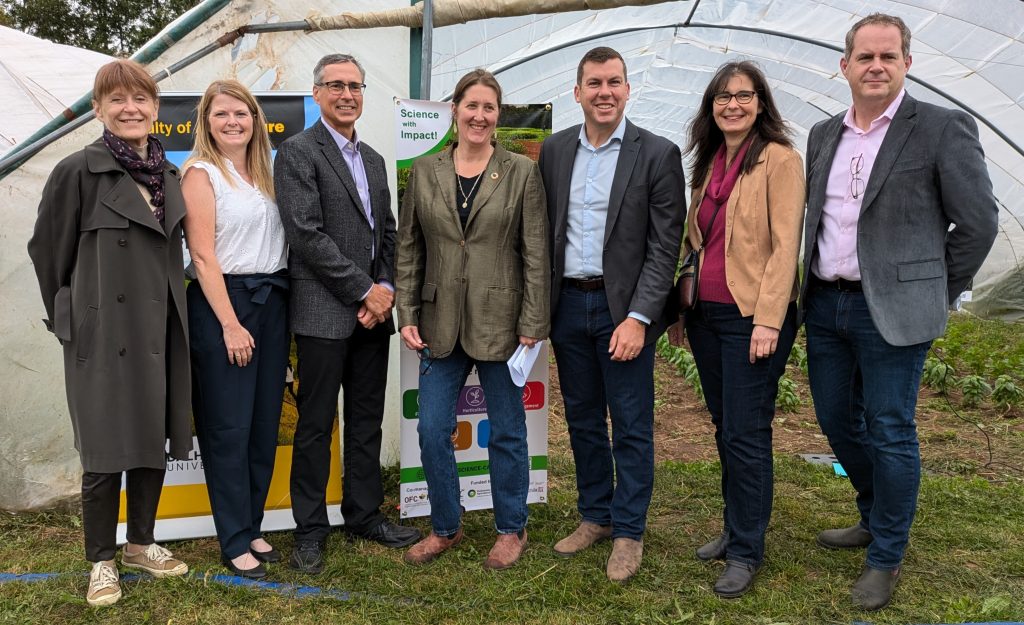
Organic Science Cluster 3
All across Canada, in fields and barns, laboratories and market gardens, scientists are conducting research on organic farming methods.
And not just scientists. More than 150 organic farmers and 79 researchers from 22 universities and 14 government research stations are engaged in the Organic Science Cluster 3 (OSC3).
Organic Science Cluster 3 is a joint initiative led by the Organic Federation of Canada in collaboration with the Organic Agriculture Centre of Canada at Dalhousie University to serve the needs of Canada’s organic sector.
The 27 research activities of the OSC3 range from developing organic grain and soybean varieties for large Prairie farms to controlling weeds in baby greens on market gardens.
Highlights
Partners
The Organic Science Cluster is funded by Agriculture and Agri-Food Canada and our industry partners whose contributions cover more than 30% of the expenses of the research activities.
The following is the list of the industry partners who support the development of organic science in Canada.
List of contributing partners and the activities they support.
Featured Articles
The Organic Federation of Canada publishes a series of feature articles to recognize the contributions of the Organic Science Cluster industry partners.
Canadian Centre for Swine Improvement
Welfare friendly alternative to surgical castration for organic pigs
Ostara Nutrient Technologies Inc.
Closing the loop on Phosphorus in organic crop production
The Magazine
Organic Science Canada
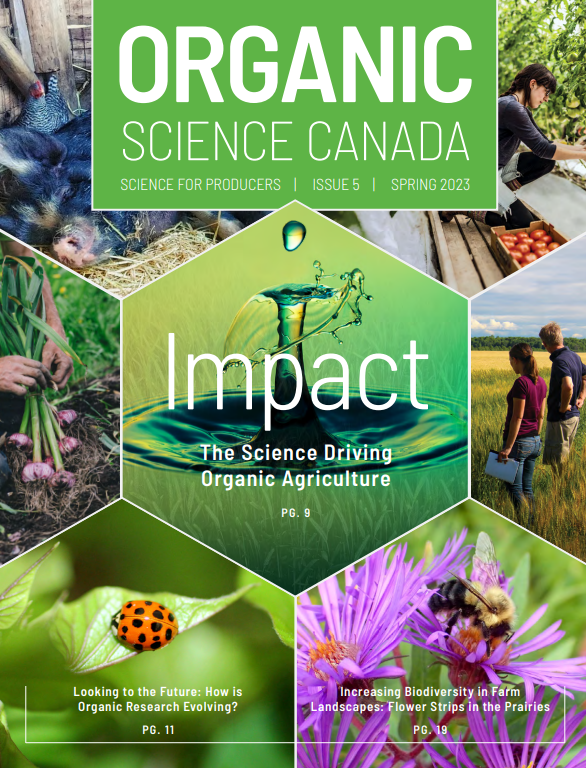
Issue 2023
An issue dedicated to the impact of research on organic agriculture
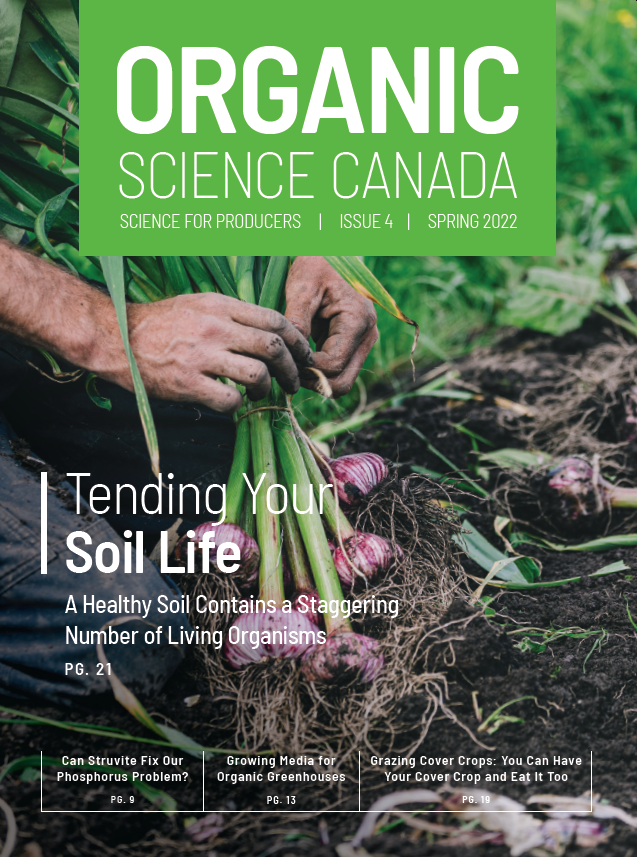
Issue 2022
An issue dedicated to soil health
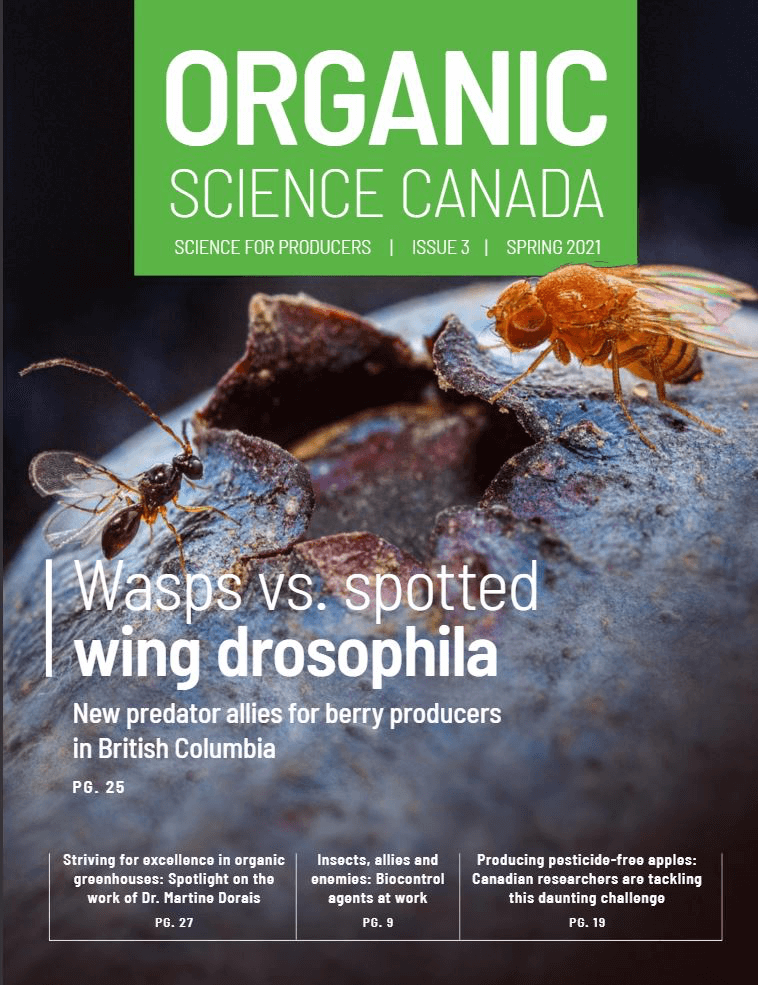
Issue 2021
Presenting the latest research in organic horticulture production.
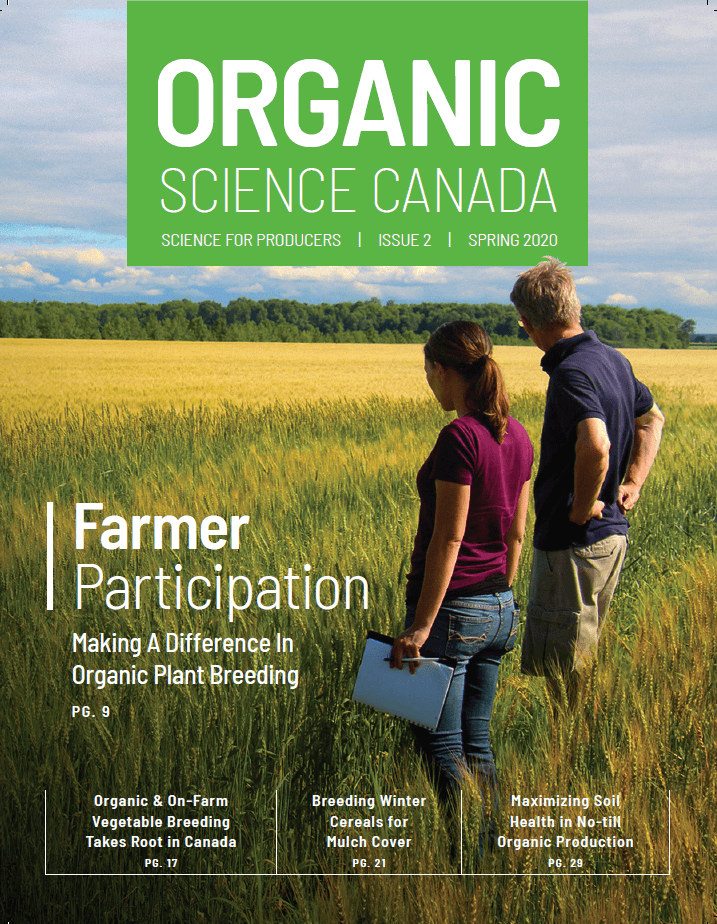
Issue 2020
Presenting the latest research in organic field crop production.
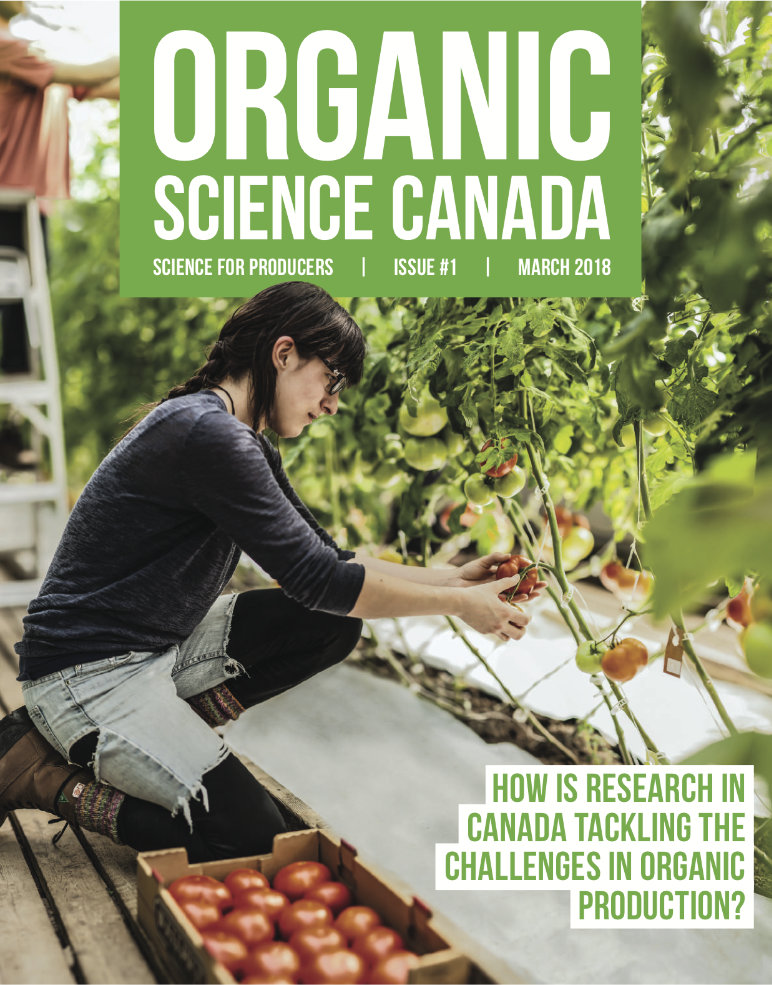
Issue 2018
Advancing the science of organic agriculture in Canada.
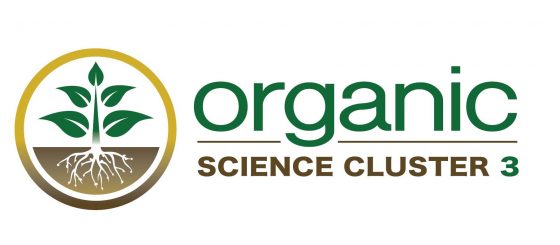
Podcast Episodes
The Ecological Challenge of Controlling the Pestilent Wireworm
Wireworms can cause serious damage to horticultural food crops. Todd Kabaluk evaluates practices that maintain wireworms at levels acceptable for production of smaller-scale food crops.
The Organic Control of the Spotted Wing Drosophila
Dr. Chandra Moffat speaks about her role in the development of multiple strategies for the management of the spotted wing drosophila, with a focus on organic methods of control.
Best Organic Practices for Enhancing Vineyard Soil Health
Dr. Mehdi Sharifi, in partnership with Dr. Liette Vasseur, tests the combinations of cover crops, rootstocks, and irrigation for enhancing vineyard soil health.
Growing Organic Vegetables as an Act of Environmental Stewardship
Sustainable vegetable production can shape the agricultural landscape: Sean Smukler is building an online tool to enhance nutrient management planning and enhance land stewardship.

Organic Science Cluster 2
The Organic Science Cluster II is an industry-supported research and development endeavor initiated by the Organic Agriculture Centre of Canada at Dalhousie University in collaboration with the Organic Federation of Canada.
Its outcomes are centered on competitiveness, market growth, adaptability and sustainability. This will be accomplished through science and innovation in the following Themes:
A. Field crops: Optimizing productivity and competitiveness through adaptable systems for field crops
B. Horticultural crops: Advancing the science of vegetable, fruit and novel horticultural crops
C. Crop pests: Innovation in sustainable pest management strategies
D. Livestock: Optimizing animal health and welfare for productivity and quality
E. Value Adding: Adding value to capture markets through innovative processing solutions
Innovation is needed for the organic sector to be competitive and to grow and prosper. Innovation in OSCII will address barriers constraining production, increase efficiency of production by reducing cost, and facilitate the capturing of new opportunities.
Examples of innovation in OSCII include:
- crop breeding for improved cultivars,
- reduced tillage systems under organic management,
- use of biological soil amendments to improve plant health,
- development of new management products and practices for crop pests (insects, diseases and weeds) in field and storage as well as diseases and parasites of livestock,
- technological advances in greenhouse and high tunnel production,
- optimization of the nutritional value of crops,
- advanced processing techniques to develop value-added products,
- improved methods of meat preservation,
- and the use of waste byproducts to enhance productivity.
OSCII will also help producers capture opportunities by supporting the development of emerging and juvenile organic production in Canada responding to market demand including: hops, nutraceuticals, sprouts, ornamental potted plants, and poultry.
For more information, please contact Nicole Boudreau (info@organicfederation.ca), for the Organic Federation of Canada or Dr. Andrew Hammermeister (andrew.hammermeister@dal.ca), for OACC, Dalhousie University.
Scientific Organic Conference 2016
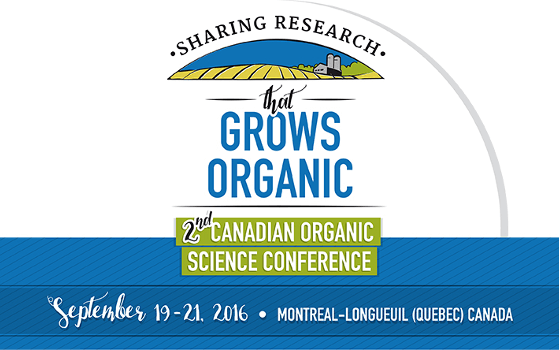
World renowned international and Canadian scientists have presented their research in all aspects of organic agriculture, including crop and livestock production, soil science, and value chain development.
Producers Engaging in Research
Watch and learn about how producers and researchers are experimenting with organic apples, cranberries, tomatoes, strawberries, cucumbers, hops and nutraceuticals to protect these crops from weeds and get good yields.
All of these research activities are part of the Organic Science Cluster II project (2013-2018), and each film lasts from 4 to 9 minutes. The Organic Federation of Canada and the Organic Agriculture Center of Canada invite you to click on the titles below to watch the films on YouTube. Enjoy!
Organic apple production can be difficult in Eastern Canada because of the dozens of types of insect pests and diseases that can damage the crop. However, production of apples under exclusion nets that protect trees from insects and scab could be a way to meet the growing demand for locally produced organic apples.
Mirella Aoun (CETAB+), describes the research activity that will examine the efficiency of exclusion nets in preventing apple tree pests and diseases without affecting the quality of the fruit. This Organic Science Cluster II activity is led by Gérald Chouinard, researcher at IRDA.
For a full description of the activity – click here
Cranberries require a significant amount of water when the crop is being established, but water also fosters the establishment of weeds. Mirella Aoun, researcher at CETAB+, and Sylvain Lemoine, co-owner of the Canneberges du Roy, are working together to determine the optimal irrigation management that supports the establishment of cranberries while avoiding the invasion of tough perennial weeds.
For a full description of the activity – click here
Frédéric Jobin-Lawler and Annie Lévesque, co-owners of the Abri végétal, are experimenting with the production of organic vegetables in a semi-closed greenhouse by testing the use of a geothermal pump that will help to optimize carbon dioxide levels while controlling the humidity of the greenhouse microclimate.
For a full description of the activity – click here
Nutra Canada is studying the production of certified organic extracts from cranberries, blueberries, strawberries, apples, melons, and various vegetables, and is designing an efficient biorefining process that will preserve the quality of the organic sources that are used. André Gosselin, the President of the enterprise, describes the challenges associated with the production of the best certified organic nutraceuticals.
For a full description of the activity – click here
Frank Zyromski Greenhouses, located at Rivière Rouge (Quebec), is experimenting with the organic production of ornamental flowers. Nicolas Zyromski describes how they are investigating LED lighting to obtain high quality, organically certified cuttings and potted flowering plants under the leadership of Martine Dorais, an AAFC researcher.
For a full description of the activity – click here
At the Fraises de l’Île d’Orléans, Louis Gauthier, Research and Development Manager, explains how the absorption of silicon (Si) by strawberries can provide protection against a number of biotic stresses, and is often as effective as a fungicides. In cooperation with Richard Bélanger (Laval University) and Martine Dorais (AAFC), they are testing the ability of strawberry plants to absorb Si and exploring the benefits that the plants can draw from it this substance.
For a full description of the activity – click here
At the Lefort Greenhouses, established on the south shore of Montreal, two hectares of organic cucumbers and tomatoes are grown under cover. Julie Lefort cooperates in a research activity led by Martine Dorais, researcher at Agriculture and Agri-Food Canada, alongside researchers at Laval University. Fertilization and lighting trials with scientific monitoring have become part of their daily routine.
For a full description of the activity – click here
At the Gosselin Hop Yard, Jean and Guillaume Gosselin grow an organic crop for the nutraceutical market in the province of Quebec. To improve their production, they are cooperating with a team a of researchers led by Martine Dorais, a researcher with Agriculture and Agri-Food Canada, and they explain how this research impacts their production of hops, a giant plant that reaches over 6 meters within 30 days.
For a full description of the activity – click here

Organic Science Cluster 1
$ 8,660,000 Invested in Organic Research
September 1st 2010, the Canadian Minister of Agriculture and Agri-Food Gerry Ritz announced a funding of $6.5 million, matched by $2.2 million from industry partners to establish Canada’s Organic Science Cluster (OSC).
The funding, awarded through Agriculture and Agri-Food Canada’s Growing Forward Program, is meant to support growth in the organic sector by strengthening the science behind organic agriculture in Canada.
The Organic Federation of Canada is the applicant on behalf of the Canadian organic sector, but the OSC will be managed by the Organic Agriculture Center of Canada.
The OSC:
– involves 80 lead and collaborating scientists, the longest standing and leading scientists in organic agriculture, who will be working alongside other scientists who are leaders in their respective disciplines;
– will run until March 2013, spans the country with activities in nine provinces, engaging all major agricultural universities in Canada and enlisting the collaboration of Agriculture and Agri-Food Canada scientists;
– involves twenty industry partners, representing many aspects of the organic sector across the country, that will contribute $2.2 million in matching funds to support research activities;
– includes 30 research activities that will:
- set the groundwork for significant improvements in phosphorus use efficiency in organic crop production,
- lead organic into an era of low-till production without herbicides,
- provide a landmark breakthrough in energy efficient organic greenhouse production,
- develop effective systems for management of organic horticultural crops,
- characterize the contribution of organic production to reducing greenhouse gas emissions,
- establish benchmarks for animal health and welfare in dairying,
- study parasitic infections in sheep production,
- and address barriers in high value fruit production.
The Organic Science Cluster will serve to strengthen the capacity and market for domestic organic production while supporting ecologically sound farming practices.
Regular updates will be posted on OACC website.
First Scientific Organic Conference in Canada
The Organic Federation of Canada invites you to view a series of four videos shot at the Canadian Organic Science Conference (COSC), held in Winnipeg, Manitoba from February 21-23, 2012, featuring Canadian organic scientists and producers sharing their experiences, their vision, and mostly, their great dedication to the development of sound organic production systems in Canada.
Click on titles to view the videos (approximately 20 minutes each).
The Impact of Research on Organic Agriculture
Organic Researchers in Canada and the United States
Interviews with Canadian Researchers
- Martin Entz co-chairs the first Canadian scientific organic conference – Martin Entz
- Organic Greenhouse Production to Feed the Planet – Martine Dorais
- Why is Canada is such a Unique Country for Producing Organic Food – Andy Hammermeister
- The Projects of the Organic Science Cluster Answer Producers’ Needs – Frédéric Jobin-Lawler (industry partner of the OSC)
- The apple tree immunologist – Gordon Braun
- A Canadian Wheat Breeder – Stephen Fox
- Having new trees thriving in organic orchards – Louise Nelson
- Canadians need greater help when transitioning to organic farming – Rod MacRae
- Maybe you ate an oat variwety crafted by Jennifer Mitchell Fetch – Jennifer Mitchell Fetch
- Soil microorganisms are at the heart of the new green revolution – Chantal Hamel
